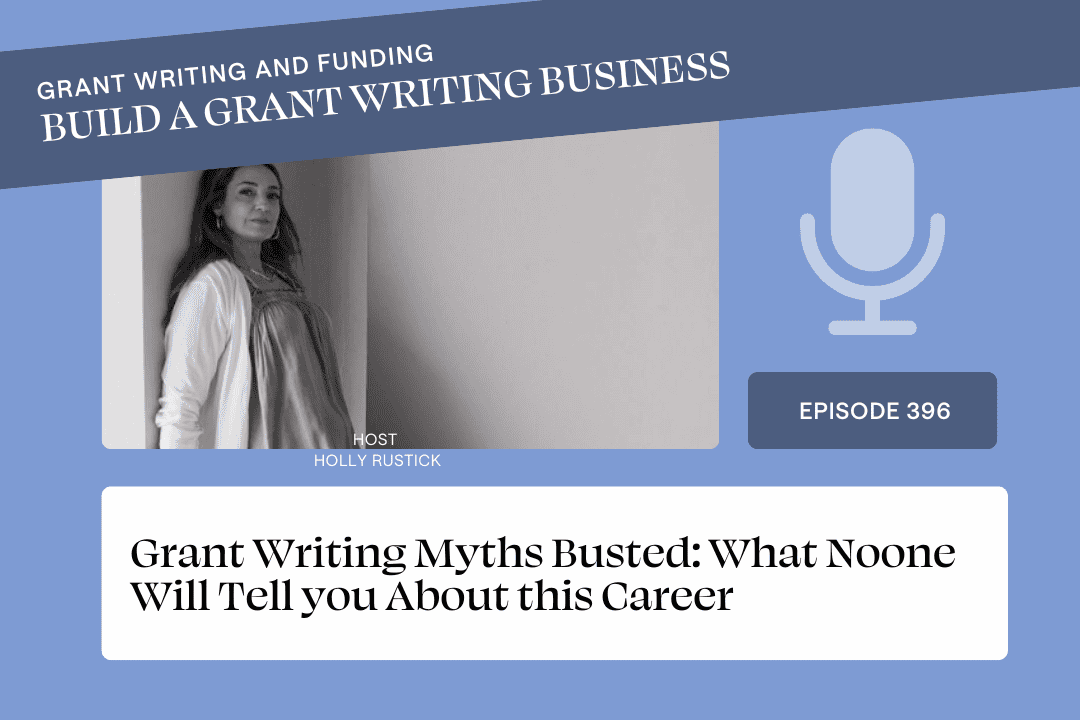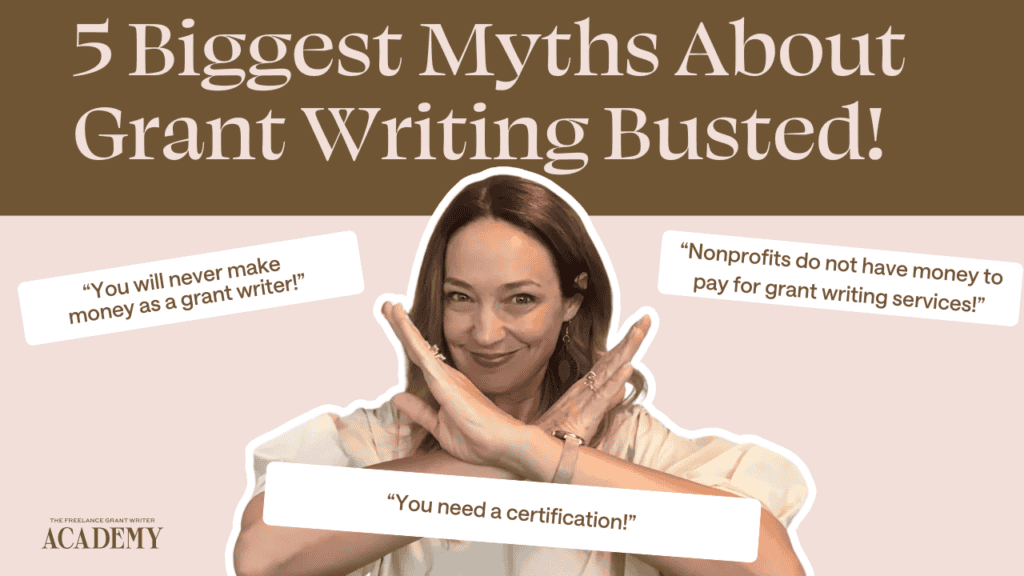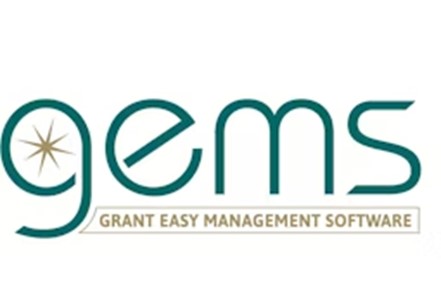Grant Writing Myths: What No One Will Tell You About this Career

April 8, 2025
Surprisingly, there are a lot of myths out there about grant writing. From the myth of working on commission to nonprofits not having money to hire grant writers, these myths might hold you back from even starting a career in grant writing.
Why are there so many grant writing myths out there? Because a lot of folks aren’t familiar with grant writing or nonprofit organizations in general. Even many folks who start nonprofit organizations aren’t familiar with how they operate, they just have a passion for helping causes.
Grant writing (to non-grant writers) also feels very mysterious and a bit untouchable. However, it’s not. Grant writing as a career is simply offering a service for organizations using your skills and experience.
With a successful 20-year grant writing career that is still going strong, I decided it was time to break down some of these myths!
Myth #1 – Nonprofits Don’t Have Money to Pay for Grant Writing Services
The Truth – Nonprofits WILL Pay for Grant Writing Services
Yes, many nonprofits may say they don’t have funding to hire you. But there are plenty that will pay for your grant writing services.
Inside the Freelance Grant Writer Academy and Grant Professional Mentorship, our students have collectively received more than $4 million in their grant writing services in just one year.
That’s proof that there’s money out there to pay for grant writing services. Literally millions of dollars…from nonprofit organizations.
Nonprofits actually make up 5.6 percent of the GDP in America, which was $1.5 trillion (2022).
Nonprofits employ people, rent spaces, and contract vendors, on top of providing programs in communities.
Therefore, your grant writing services are just like any other essential service, like hiring someone to create a website, paying an accountant to track fundraising money, contracting an IT technician to fix a printer, etc.
Why is lack of money such a persistent grant writing myth?
Because many nonprofits will ask you to do service work pro bono (for free). Their board of directors may have a policy that the Executive Director always needs to first ask for pro bono or a discount with any vendor or contractor.
Some vendors do offer pro bono services or discounts to nonprofits, while many do not. Usually those that offer pro bono services are in some way affiliated with the board (think a lawyer on the board who may write the Articles of Incorporation for free or the Treasurer will be the bookkeeper for a small nonprofit).
But this is NOT required and many nonprofits will find the money to invest in your grant writing services if grants are a priority for their nonprofit.
Myth #2: Grant Writers Can Get Paid on Commission
The Truth – It’s Unethical for Grant Writers to Get Paid on Commission
A popular myth is that grant writers can get paid on commission; i.e. the grant writer gets paid a percentage of the grant if it gets awarded.
The thought process for many nonprofit organizations on paying a grant writer on commission is that:
- They would not have to pay upfront (from their limited or no budget)
- The grant writer will work super hard to get the grant awarded (i.e. they only get paid if the grant gets awarded)
- Part of the awarded grant will pay the grant writer (i.e. no out-of-pocket expenses from the nonprofit)
This might seem like a win-win situation, but it’s not. Nor is it ethical
Here are four reasons why grant writers cannot get paid on commission:
#1: Writing a Grant on Commission is Against Best Practices & Is Unethical
Getting paid a percentage of the grant award is against the best practices of the grant writing community. This includes best practices from the Association of Funding Professionals, Grant Professionals Association, and Grantsmanship Center, and here at Grant Writing & Funding.
Getting paid on commission for writing grants is against the Grant Professionals Association Code of Ethics:
19. Members shall not accept or pay a finder’s fee, commission, or percentage compensation based on grants and shall take care to discourage organizations from making such payments.
#2: Writing Grants on Commission is Unallowable for Federal Funding
For federal grants, this is a no-no.
The OMB Super Circular Uniform Guidance states that proposal costs are aligned with the Generally Accepted Accounting Principles (GAAP), and pre-awarded allowable costs are very specific.
The Uniform Guidance (2 C.F.R. Part 200) establishes uniform administrative requirements, cost principles, and audit requirements for Federal awards to non-Federal entities.
§ 200.458 Pre-award costs. “Pre-award costs are those incurred prior to the effective date of the Federal award or subaward directly pursuant to the negotiation and in anticipation of the Federal award where such costs are necessary for efficient and timely performance of the scope of work. Such costs are allowable only to the extent that they would have been allowable if incurred after the date of the Federal award and only with the written approval of the Federal awarding agency.
The GAAP standards state that fundraising services should be paid “at the time services are provided.”
In short, it is unallowable to pay a grant writer from a grant for previous work that was done before the grant was awarded.
#3: Grant Budgets Cannot Be Allocated For Pre-Award Costs
This point is similar to the point above, but there we examined mainly why you cannot pay grant writers on commission according to accounting and cost principles.
There is also a logistical side of how grant budgets are designed that prevent grant writers from being paid on commission.
When creating a budget for a grant program, you design for costs to (generally) create, operate, or expand a nonprofit’s program. These budgets are generally for future projects (or expansion of programs).
Once the grant is submitted, it goes through a review process. If the grant is awarded, the organization enters into a grant agreement (contract) with the funding source. The budget for what you requested is then approved starting on the date specified in the grant agreement, which is generally on or after the date of the grant award.
The grant writing happened before the contract was awarded. The grant writing is also not a future part of the program and each category in the budget is allocated for something specific.
For example, you write a budget for a youth sports program that amounts to $250,000. If you were to pay a grant writer 10 percent of the grant that got awarded, you would pay them $25,000. This means you would have to take $25,000 out of the budget that has no line item to pay a grant writer (because it’s unallowable – refer to point #2).
#4: Writing Grants on Commission Is Unethical because a Grant Is a Product
Once a grant writer has written a grant, they have created a product. This product is essentially a business plan that can be used for multiple funding requests.
Plus, writing the grant proposal takes a grant writer’s time, technical writing experience, and grant writing knowledge. Many grant writers invest in grant writing courses and hone their skills over many years.
Even if the grant proposal does NOT get awarded, it is still a product that can be repurposed for the following items:
- Resubmit to the same funding source next funding cycle (i.e. get feedback and edit the application and re-submit)
- Submit to other grant funding sources
- Submit for funding to corporate sponsors, etc.
- Use the copy from the grant for fundraisers, on websites, fliers, social media, etc.
Remember, a grant writer is creating a product. Whether the grant is awarded or not, the grant product can be utilized for many other funding ideas and strengthening partnerships.

Myth #3: Grants Are Super Hard to Write and You Need a Writing Background
Truth: Grants Are a Formulaic Process Anyone Can Learn
This myth actually serves freelance grant writers well. Why? Because everyone else thinks that writing grants is so hard they don’t even try to learn, which means they hire you instead.
The truth is you don’t need a grant writing degree or English degree to write a grant. All you need to know is the process of how to write a grant.
And grant writing is a formulaic process.
We lay out this entire formula inside the Freelance Grant Writer Academy where students perfect the skill of writing a master grant template. But the basic thing every potential grant writer needs to know is that there is a formula that you can learn.
I like to relate this formula to a puzzle. You need a problem statement, goal, objectives, work plan, and budget as your core pieces.
You can learn how to write each of these and then connect them together. Every single grant requires these basic pieces, even if they give them a different name.
Myth #4: You Need a Grant Writing Certification
Truth: You Don’t Need a Grant Writing Certification to Write Grants
You don’t need a grant writing certification to be an excellent grant writer or to get clients.
You just need to learn the formulaic process of writing grants and then start writing grants. However, some people feel like they need to have a certification before they can write grants or get clients. That is usually due to imposter syndrome.
Others want a grant writing certification to further their education or to simply overcome the question they will get during sales calls with nonprofits who ask, “Do you have a grant writing certification?”
Instead of explaining that we don’t actually need them to be excellent grant writers, sometimes it’s just easier to say, “Yes, I do.”
Because at the end of the day, the nonprofit client doesn’t know the difference between grant writing certifications or if having a certification makes you more of an expert (according to Global Development Solutions Pricing Survey 2023, it doesn’t).
Reasons why you might still want a grant writing certification
There are a couple of reasons you might want a grant writing certification. Externally, having a grant writing certification will get you:
- An easy answer to the question, “Do you have a grant writing certificate?”
- A signature of experience (literally, put the logo in your email signature), and
- Credibility.
You can put the name of your certification on your resume, website, LinkedIn profile, or/and business card!
This provides external affirmation of your skills.
Internally, the process of getting a grant writing certification can help improve your skills, knowledge, and confidence in writing grants.
This is the heart of it.
A grant writing certification does not replace grant writing experience
To have long-standing credibility and a reputation and to implement your learned skills, you need to practice writing grants.
Yes, a grant writing certification can increase your resume and improve your skills, but actually going through the process of writing an entire grant template and getting feedback will make this skill real.
Inside the Freelance Grant Writer Academy, we have our Grant Writing Master Course and 30-Day Master Grant Template where you can get our internal Grant Writing Certification and also up to 31 Education Credit Hours towards the Grant Professional Certification Institute.
Why do we include a Certification and hours towards the GPCI if a grant writing certification is not needed?
Because a grant writing certification can be helpful in increasing credibility, knowledge, skills, and confidence.
Myth #5: You will always get your heartstrings pulled and never make money as a grant writer
Truth: You can still be compassionate and charge for your grant writing services
Let’s debunk the whole ‘heartstrings’ do-gooder attitude.
Now, I’m not saying you aren’t a good person if you want to write grants for free – if you have a trust fund, rich partner, or whatnot.
But for most of us out there, we need to make some income to pay the bills.
And even if we don’t ‘need it,’ we may just desire to feel more financially stable or know that nonprofits will respect our time more if we charge.
That was me.
I used to give discounts because the nonprofit was led by a friend of mine. So I wanted to be ‘nice' and fair to a friend.
But what led to that feeling of ‘nice equalling fairness’ was SO off.
I would instead feel bitter because I still needed to pay my bills and now filled up my time taking on a client that wasn't meeting what my business needed.
This wasn't fair at all. Nor was it nice to my daughter who I spent time away from because I then needed to work “MORE” and take on extra clients to pay all the bills.
I know I'm not alone.
We get stuck – especially us women – with feeling like we are not a good person if we charge for our grant writing services or don’t give discounts.
We love the cause of a nonprofit and think they can’t afford our services.
I would probably have $1,000 if I had a penny for every time an Academy student on a Coaching Call said, “It just pulled at my heartstrings so I gave a deep discount.”
While you may be passionate about the cause of the nonprofit (and likely are! Most nonprofits’ causes are amazing!), you don't give discounts just because you love what they are doing.
You heard me.
You can design service offerings that can meet nonprofits that have shoestring budgets – without overworking and undercharging!
It’s nice to be passionate about your work.
But it’s also nice to feel supported by your work and to have time with your family.
Giving discounts doesn’t make you a nice person.
I’m sure you already are a nice person as you want to help nonprofits with causes that you care about getting funding.
It can be a win-win situation, heartstrings and all.
Inside the Academy we help you understand who you want to write grants for, what their annual operating budgets are, what services would be the highest ROI for investing with you, and fair prices to charge. You can still get your heartstrings pulled, be a nice person, and get paid your full rates. You don't need to overwork or have time away from your family to be nice and fair.
Links Mentioned
Freelance Grant Writer Academy
Grant Professional Certification Institute
Rate, Review, & Follow on Apple Podcasts
“Every time I listen to Holly’s show, I learn something” <– If that sounds like you, please consider rating and reviewing my show! This helps me support more people — just like you — move toward writing higher quality grants without overwhelm, and to start and grow successful grant writing businesses! Click here, scroll to the bottom, tap to rate with five stars, and select “Write a Review.” Then be sure to let me know what you loved most about the episode!
Also, if you haven’t done so already, follow the Grant Writing & Funding podcast. I’m adding a bunch of bonus episodes to the feed and, if you’re not following, there’s a good chance you’ll miss out. Follow now!“
This Podcast Episode is Lovingly Sponsored by:

This podcast episode is lovingly sponsored by Grant Easy Management Software (GEMS).
Break Up with Your Spreadsheet – Get GEMS Grant Easy Management Software and NEVER MISS A DEADLINE AGAIN!
Book YOUR FREE demo now! Click here.
Holly Rustick
Meet the author Holly Rustick
Work with Me
Write Grants, Get Paid.
Freelance Grant Writer Academy
Grant Professional Mentorship
JOIN OUR NEWSLETTER
Holly Rustick is a world-renowned grant writing expert and Amazon bestselling author.
Holly has been coaching grant writers how to run successful 5-6 figure businesses since 2017.
With two decades of grant writing and nonprofit experience, Holly is a popular keynote speaker for events all over the world, podcast host of the Top-Ranked Grant Writing podcast, a former university instructor, and is past president of the Guam Women’s Chamber of Commerce. She is constantly booked out to run trainings to help grant writers grow capacity, increase funding, and advance mission.
Love this post? You'll love these resources.
GET ACCESS NOW
Free Grant Writing Class
Get the proven 7 steps to eliminate anxiety and get Holly’s 20 years of secrets to start writing winning grants.
You will get the grant writing system that has helped Holly secure more than $25 million in grant funding and students earn more than $100,000,000 in funding for nonprofits around the world!
GET ACCESS NOW
Free 5-Step Checklist
OUR SPICY BELIEF IS THAT ALL GRANT WRITERS SHOULD START A BUSINESS, EVEN IF IT’S PART-TIME.
Work from home and have a massive impact on your community. Set up a grant writing business so you can start getting paid to write grants.